Books
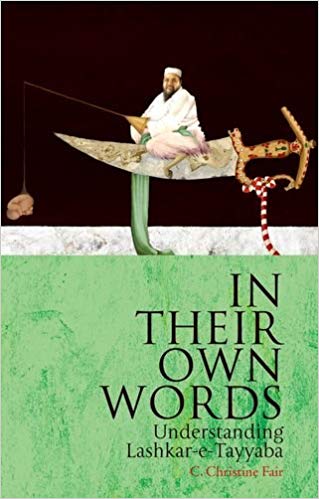 |
In Their Own WordsReviews This path-breaking volume reveals a little-known aspect of how Lashkar-e-Tayyaba, a jihadist terrorist group, functions in Pakistan and beyond by translating and commenting upon a range of publications produced and disseminated by Dar-ul-Andlus, the publishing wing of LeT. Only a fraction of LeT's cadres ever see battle: most of them are despatched on nation-wide "prozelytising" (dawa) missions to convert Pakistanis to their particular interpretation of Islam, in support of which LeT has developed a sophisticated propagandist literature. This canon of Islamist texts is the most popular and potent weapon in LeT's arsenal, and its scrutiny affords insights into how and who the group recruits; LeT's justification for jihad; its vision of itself in global and regional politics; the enemies LeT identifies and the allies it cultivates; and how and where it conducts its operations. It is only by understanding LeT's domestic functions as set out in these texts that one can begin to appreciate why Pakistan so fiercely supports it, despite mounting international pressure to disband the group. |
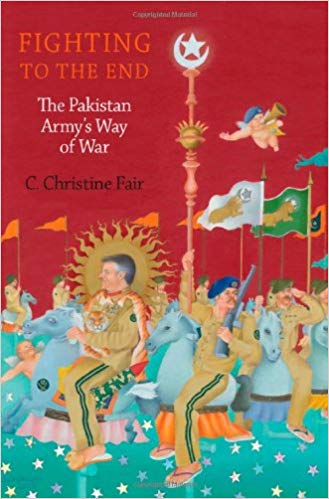 |
Fighting To The EndReviews "In this painstakingly developed and brilliantly argued book, one of America's leading South Asia scholars examines Pakistan's chronic insecurities and grand ideological ambitions that generate high levels of conflict for itself, the region, and the world. Using extensive primary and secondary sources, Christine Fair shows conclusively that Pakistan is insecure not only for its inability to obtain Kashmir, but due to a civilizational notion that it ought to be a co-equal with India and that it should employ all means, including Jihadist violence, to obtain strategic parity with its larger neighbor. Her findings have far-reaching consequences and immense policy implications." --T.V. Paul, McGill University, and author of The Warrior State |
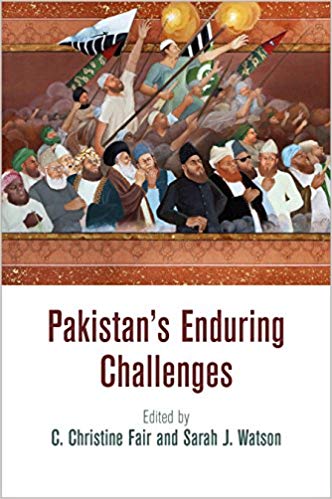 |
Pakistan's Enduring ChallengesReviews Pakistan's Enduring Challenges surveys the political and economic landscape of Pakistan in the wake of U.S. military withdrawal. Experts in the domestic and international affairs of the region consider the country's prospects from a variety of angles, including security issues and nuclear posture, relations with Afghanistan, India, and the United States, Pakistan's Islamist movements, and the CIA's use of drone warfare in Pakistan's tribal areas. This timely volume offers a concise, accessible, and expert guide to the currents that will shape the country's future. |
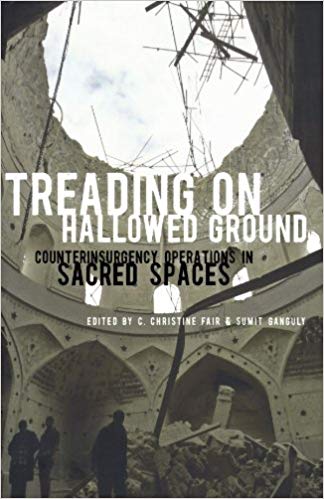 |
Treading on Hallowed GroundReviews How do we fight against an insurgency that so often strategically positions itself on 'hallowed ground'--mosques and shrines? As the contributors to Treading on Hallowed Ground show, counterinsurgency efforts on religiously contentious terrain is a widespread phenomenon in recent times, ranging from North Africa to Central and Southeast Asia. Here, C. Christine Fair and Sumit Ganguly have assembled an impressive group of experts to explore the most important counterinsurgency efforts in sacred spaces in our era: churches in Israel, mosques and shrines in Iraq, the Sikh Golden Temple in India, mosques and temples in Kashmir, the Krue Se Mosque in Thailand, and the Grand Mosque in Saudi Arabia. Taken together, the essays comprise the first comprehensive account of this increasingly pivotal component of contemporary war. |
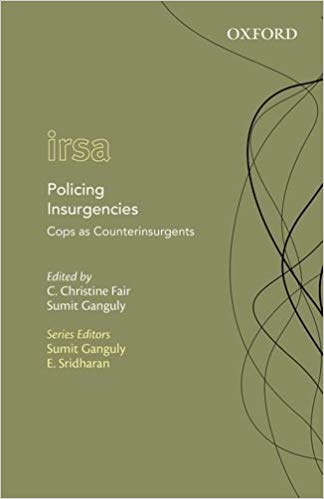 |
Policing InsurgenciesReviews The importance of police forces in combating insurgencies is receiving increasing attention from policymakers and national leaders, but there is little academic work addressing the question of how police forces should be trained and deployed in such conflicts. This edited volume sets out to correct this imbalance through a series of case studies, drawn from Central, South, and Southeast Asia, as also Africa and the Middle East, which examine the circumstances under which police forces have failed to quell insurgencies-or even worsened internal security-as well as when they have proved themselves an essential part of the solution. Each case study covers the history of the insurgency, attempts to reform the police forces to confront it, and the success or failure of those attempts, concluding by presenting lessons learned for future counterinsurgent governments. Each chapter is written by a well-established scholar who has spent considerable time in the country under study. |
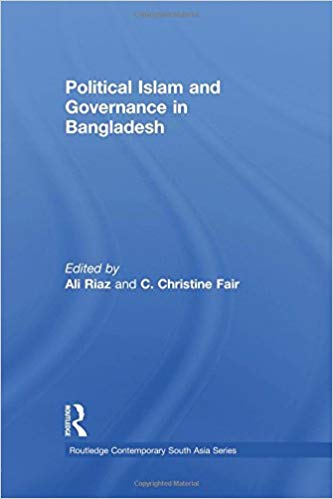 |
Political Islam and Governance in BangladeshReviews Bringing together journalists and academics - all of whom have different professional and methodological backgrounds and field experiences which impact upon these issues from different vantage points - the book assesses Bangladesh’s own prospects for internal stability as well as its wider impact upon South Asian security. It argues that the political environment of Bangladesh, the appeal of Islamist ideology to the general masses and the dynamic adaptability of Islamist organizations all demonstrate that Bangladesh will continue to focus the attention of policy makers and analysts alike. This is a timely, incisive and original explanation of the rise of political Islam and Islamic militancy in Bangladesh. |
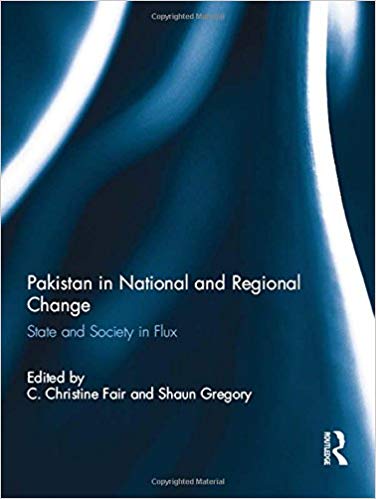 |
Pakistan in National and Regional Change: State and Society in Flux Pakistan is one of the most important states in the international system and a key concern of western security. This collection identifies a set of national and regional/international trends which will be critical in determining the medium to long-term stability and cohesion of Pakistan, yet which have received relatively little attention elsewhere. Experts on different aspects of Pakistan explore issues of political Islam, minorities, wider political trends, and the economic impacts of the recent floods to seek to explain some of the key drivers of change within Pakistan, and to reflect on the dynamics of US-Pakistan relationships and Pakistan’s rethinking of its regional relationships to understand key regional and international dynamics shaping Pakistan’s future. This book will be of interest to scholars in south asian political studies, ethnic studies and international relations. |
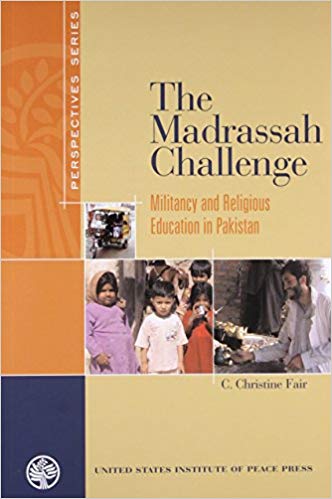 |
Madrassah Challenge: Militancy and Religious Education in PakistanReviews Fair explores the true significance of the madrassah and its role in Pakistan’s educational system. She chronicles the Pakistan government’s efforts to reform the madrassah system and offers important policy implications and suggestions for initiatives that might address some of the main concerns emanating from ostensible ties between education and security inside and outside Pakistan. |
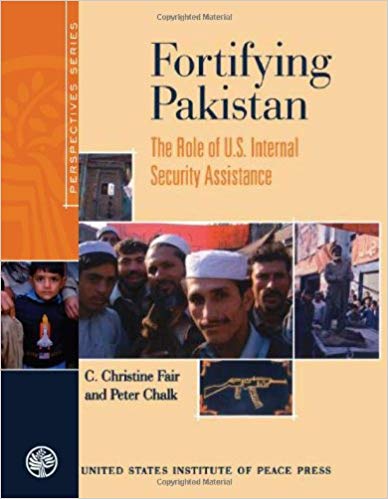 |
Fortifying Pakistan: The Role of U.S. Internal Security Assistance The authors offer a comprehensive examination of Pakistan’s internal security environment and the effectiveness of its criminal justice structures and assess the impact and utility of the principal United States initiatives to help Pakistan strengthen its internal security. |
 |
The Counterterror Coalitions: Cooperation with Pakistan and India The author examines U.S. strategic relations with India and Pakistan both historically and in the current context of the global war on terrorism and Operation Enduring Freedom in Afghanistan. Pakistan's unwillingness to halt its active role in supporting militant operations in Indian-held Kashmir and elsewhere challenges U.S. interests in reducing terrorism. India, for its part, could lessen Pakistan's threat perceptions. An inescapable conclusion of the report is that the intractable dispute over the disposition of Kashmir remains a critical flashpoint between the two states and a continual security challenge for the United States and the larger international community. The report offers five policy options on how the United States might proceed: Maintain the status quo; take an active role in resolving the dispute; distance itself from the dispute; side with India; or side with Pakistan's position on Kashmir. Each position, with benefits and disadvantages, is discussed in detail. |
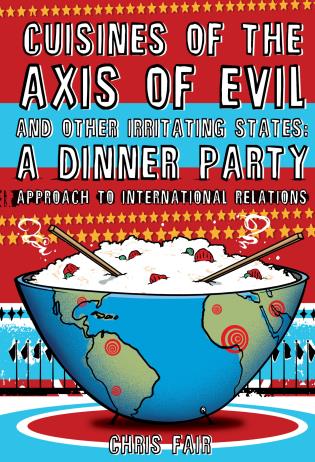 |
Cuisines of the Axis of EvilReviews Chris Fair has dined with soldiers in the Khyber Pass and with prostitutes in Delhi, rummaged for fish in Jaffna, and sipped Taliban tea in Peshawar. Cuisines of the Axis of Evil is a sophisticated, fun, and provocative cookbook with easy-to-follow recipes from both America's traditional enemies in foreign policy—including Iran, Iraq, and North Korea—and friends of the U.S. who are nonetheless irritating by any measure. In addition, each country section includes all the smart, acerbic geopolitical nuggetry you need to talk the talk with the best of them. Recipes include Iranian chicken in a walnut pomegranate stew, Iraqi kibbe, and North Korean spicy cucumber, as well as special teas, mango salads, beverage suggestions, and much more. |